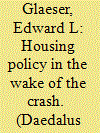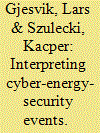| Srl | Item |
| 1 |
ID:
099439


|
|
|
| 2 |
ID:
190061


|
|
|
|
|
| Summary/Abstract |
The digitalisation of the energy system brings out the question of cyber threats. How this area is perceived and how cyber-security policy in the energy sector develops is driven by the most spectacular cyber-incidents. How do these events shape public perceptions about the dangers of digitalisation? To understand this, we look at the 2016 CrashOverride cyberattack on Ukraine’s grid. Hypothesising that cyber-energy security incidents are interpreted in the context of socio-technical imaginaries of the energy sector and security imaginaries linked to foreign policy, we distil four discourses that emerged around the Ukraine attack among Western experts and commentators. One represented it as evidence of an accelerating race towards disaster, another as merely a tip of the iceberg. The third portrayed it as less catastrophic than initially suggested, while the last one as part of Russia’s cyber strategy. Not all of these were picked up by the broader public debate in Western security circles, and only the more alarmist discourses had a visible impact beyond niche communities.
|
|
|
|
|
|
|
|
|
|
|
|
|
|
|
|
| 3 |
ID:
077353


|
|
|
|
|
| Publication |
2007.
|
| Summary/Abstract |
This article engages with a form of visual culture that is, W. J. T. Mitchell (2002: 170) reminds us, `not limited to the study of images and media', but extends also `to everyday practices of seeing and showing'. In the spirit of this openness to multiple manifestations of the domain of the visual and visual practices, the article explores how a particular mode of vigilant or watchful visuality has come to be mobilized in the `homefront' of the so-called war on terror. In homeland security programmes from border and financial screening to Highway Watch, how has sight become represented as the sovereign sense on the basis of which security decisions can be taken? Taking its illustrative cue from Paul Haggis's film Crash, and from a body of work that conceives of touch as `integral to' seeing, the article asks how we might subvert watchful politics by seeing seeing differently.
|
|
|
|
|
|
|
|
|
|
|
|
|
|
|
|